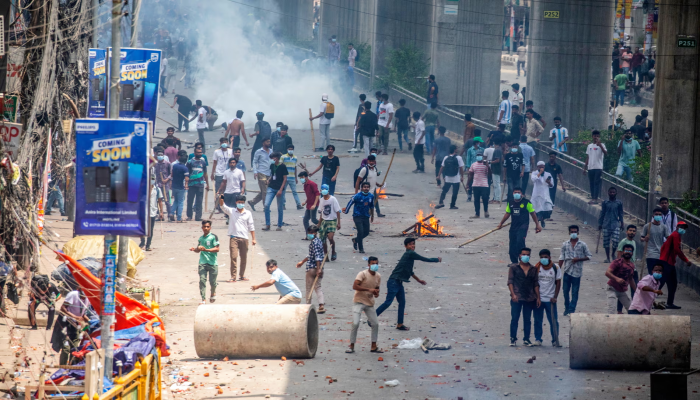 Bangladesh protests
Bangladesh protests
A communications blackout has been imposed in Bangladesh, with mobile internet access blocked and news broadcasts shut down, as the country continues to be rocked by protests that have killed 39 people this week.
On Thursday night, the government said it was shutting down mobile internet for security reasons amid growing protests led by tens of thousands of students, and access to social media was blocked.
On Friday morning, television news channels remained off air after the state broadcasting headquarters in Dhaka was stormed and set alight by protesters.
The protests began this month on university campuses as students demanded an end to a quota system that reserves 30% of government jobs for family members of veterans who fought in Bangladesh’s war of independence in 1971.
Those protesting have argued that the policy is unfair and discriminatory and particularly benefits members of the ruling Awami League party, which is led by the prime minister, Sheikh Hasina.
The demonstrations have escalated into some of worst unrest seen in a decade as pro-government student groups were accused of attacking the protesters, and police fired teargas and rubber bullets into the crowds.
Clashes between heavily armed riot police and protesters, many armed with batons and bricks, spread across the country, with vehicles set ablaze in the streets and thousands left injured.
The Dhaka Times said one of its reporters, Mehedi Hasan, was killed while covering clashes in the capital.
On Thursday protesters stormed the headquarters of the state broadcaster, Bangladesh Television, and set it on fire. Authorities said the building was safely evacuated.
Access to social media was restricted after the telecommunications minister, Zunaid Ahmed Palak, said it had been “weaponised as a tool to spread rumours, lies and disinformation”.
Hasina, 76, ordered that all universities and colleges be shut indefinitely. In a speech on Wednesday night, she had condemned the “murder” of students killed in the protests and promised justice, telling students to wait until a high court order on the quota system was given, but it did little to quell the unrest.
On Friday morning the sounds of gunfire and stun grenades could be heard coming from areas close to universities in Dhaka.
Witnesses on the ground said the protests had begun to take on a much broader anti-government tone against Hasina and her party, with slogans calling her an “authoritarian dictator”.
Hasina has ruled since 2009 and has overseen a vast and severe crackdown on political opponents and critics. Critical figures are routinely picked up in “enforced disappearances” by paramilitary forces and tens of thousands of political opponents have been jailed. She was brought back to power in January in an election that was widely documented as being heavily rigged.
The prime minister further inflamed the anger of protesters when she appeared to refer to them using the derogatory slur “razakars”, meaning those who betrayed the nation by collaborating with the enemy, Pakistan, during the war of independence.
The quotas that sparked the protests were abolished in 2018 but brought back last month after a court ruling, prompting outrage among students. Youth unemployment is high in Bangladesh and government jobs are seen as one of the few means of secure employment. Young people say the quotas make it very difficult to get the jobs on merit.
Hasina’s party, which was begun by her father who led the independence fight for Bangladesh, is accused of disproportionately benefiting from the system.
Pierre Prakash, the Asia director of the International Crisis Group, said the protests were a reflection of growing frustration on the streets at the lack of democracy and representation of the issues of the people.
“The protests reflect deep political and economic tensions in Bangladesh. For several years Bangladesh’s economy has been struggling and youth unemployment is a serious problem,” he said. “With no real alternative at the ballot box, discontented Bangladeshis have few options besides street protests to make their voices heard.”
Stéphane Dujarric, a spokesperson for the UN secretary general, said they were following developments in Bangladesh and urged restraint on all sides.
By commenting you are accepting our Comment Policy.